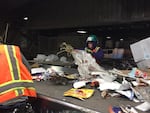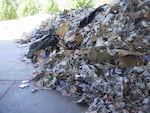
Bales of recycling get wet outside Rogue Waste Systems in White City, Ore.
Jes Burns, OPB/EarthFix
Satish and Arlene Palshikar live in a house in Southeast Portland that's coated with recycled bluish-white paint. Their boxy silver television is a 1990s vintage model they plucked from the curb.
"It said, 'Works fine,' so we said 'OK, we’ll take it,'" said Arlene Palshikar. "No packaging. Just load it in the car.”
They collect and reuse rainwater, compost their own food waste and avoid plastic whenever possible. It takes two months to fill their trash can enough to put it out on the curb for pickup.

Satish and Arlene Palshikar were shocked to learn that China plays such a pivotal role in the U.S. recycling system. They want to see the U.S. do more of its own recycling.
But they don’t use a curbside recycling bin. They’ve taken that matter into their own hands. All their recycling gets sorted into paper bags and set aside.
Once a month, they load the bags into their Prius and drive them to a recycling facility where they can place each item in the proper collection bin.
That is, until recently. A few weeks ago, they showed up at FarWest Recycling with a full carload and found the plastic bins were missing.
“They took all the plastic bins away," said Satish Palshikar. "There was no plastic recycling. The fellow said, 'We don’t take plastic anymore.'”
He tried offering to pay more than the $5 recycling charge.
“I said I will pay five — I will pay more than that — seven," he said. "Will you please take the plastic? And he said, 'No. We don't take it. Nobody takes it. It should go in the trash.'”
Why would environmentally friendly Northwesterners be told to put recyclable plastic in the trash?
Because there's nowhere else for it to go.
Across the region, recyclers are facing the consequences of new restrictions on selling recovered paper and plastic to China.
Earlier this year, the biggest buyer of our recyclables said it doesn't want our paper and plastic anymore — they're too dirty.
The official cut-off date for 24 different types of materials is Jan. 1, but we're already getting an eye-opening preview of what's ahead.
Recycling turns to trash
At Rogue Waste Systems in the southern Oregon town of White City, about 140 tons of recycling are compressed into 1-ton bales each day.
Manager Scott Fowler says there are always non-recyclables mixed in.
“That bucket right there is obviously not a recyclable material,” he said.

Rogue Waste System's Scott Fowler pulls non-recyclable trash out of the co-mingled recycling mix.
Jes Burns, OPB/EarthFix
There’s a roll of linoleum, gas cans, a surprising number of knitted sweaters, blankets, a radiator and a well-used briefcase. It all arrived in one morning.
These, as well as all the less egregious contaminants like frozen food cartons, bubble wrap and plastic bags, mean that China doesn’t want our recycling anymore. So it sits here.
"We're already at almost 2,000 tons," he said. "More than we've ever had on the site."
And what do you call recycling with no place to go?
"Right now, by definition, that material out there is garbage. It has no value. There is no demand for it in the marketplace," Fowler said. "It's garbage.”
In the large, open transfer facility, Rogue Waste’s Laura Leebrick is dwarfed by stacks of these orphaned recycling bales. The warehouse is at capacity. The bales are also stacked four high and two deep along the outside walls.
And recently employees have been competing over a dwindling number of parking spaces for their Chevys, Kias and Dodges. That's because their parking lot is being overtaken by compressed cubes of sour cream containers, broken wine bottles and junk mail.

This transfer station in Southern Oregon has no where to store their recycling, so they've resorted to stacking it under tarps in the employee parking lot.
Jes Burns, OPB/EarthFix
“It just keeps coming and coming and coming,” Leebrick said.
So right now Rogue Waste — with no buyers for its recycling — has a garbage problem. It's one of a dozen recycling companies that have asked Oregon environmental regulators for permission to dump it in the landfill.
In a letter to Oregon Department of Environmental Quality, Michael Henry, president of Pendleton's recycling company Pendleton Sanitary Services, detailed the kind of problem companies that collect recycling are facing without Chinese buyers.
"We are having extreme difficulty marketing some recycled materials," he wrote, noting that he just received a quote from a company offering to take the eastern Oregon city's plastic recycling for a fee of $90 a ton. "Yes, that is we pay $90 a ton to dispose of the material."
Add the shipping charges and it would cost his company $115 a ton to recycle the plastic, he wrote, compared with $30 a ton to send it to the local landfill.
"We have a warehouse full of this material and need an answer ASAP regarding how to deal with this issue," he wrote. "Bottom line question is can we landfill the material?"
Leebrick says changes are likely coming to what customers will be allowed to put in their curbside recycling bins. But even then, she’s doubtful they’ll ever get their recycling clean enough for China.
"They're expecting 0.3 percent of contamination," Leebrick said. "That's impossible. No one can sort to that specification."
Bring in the robots?

Workers at the FarWest recycling facility in Hillsboro, Oregon, pull out contaminants like plastic and rope from the recycling that people put in their curbside recycling bins.
Cassandra Profita, OPB / EarthFix
A company that builds recycling equipment in Eugene, Oregon, may have the answer to meeting China’s new standards.
Normally, all that recycling stacked up in Southern Oregon goes to a sorting facility. It gets dumped onto conveyor belts, and people have to reach in and pick out the stuff that doesn’t belong as it whizzes by.
A plastic lid in the newspaper stream? That’s a contaminant — pick it out. Cardboard in the plastic stream? Grab it. That’s contamination, too.
Bulk Handling Systems CEO Steve Miller says he has a better idea. Enter the Max AI — that’s AI for artificial intelligence.
Video courtesy of Bulk Handling Systems.
Miller is standing in front of a conveyor belt full of crumpled newspaper. From above, two robotic arms continuously reach into the piles streaming by and suck up things like cardboard, plastic bags and water bottles and drop them into bins.
Instead of a person picking through this jumble of recycling, Miller's system uses a camera and a neural network that sends instructions to a set of robotic arms.
"So we're looking at everything that's passing by and the neural network is determining what the thing is in the same way that a person would do it,” he said.
Just like a person, but faster and more accurate. The Max AI moves at a rate of 80 picks per minute – way faster than the 30 picks you could expect from a person.
And the robot grabs the right thing 90 percent of the time.
"In terms of grasping, people are relatively inefficient," Miller said. "People may do 50 to 60 percent."
So, if we let robots do the work, then can we meet China’s new standard?
“Oh, sure. It is doable," he said. "We’ve proven that over and over again.”
But these robots don’t come cheap. And none of the recycling companies in the Northwest have them.
So, what now?
For now, experts say our best bet is to be more like the Palshikars and carefully sort what we’re putting in our recycling bins. That will make it easier for recycling companies to find buyers for our piles of paper and plastic.
The Palshikars eventually found a recycling depot that was still taking plastic, but they're worried about what comes next.
"The thought of canceling recycling plastic on a large scale is kind of a disaster," said Arlene Palshikar. "We trusted officials to take care of this. We never would have expected it to be just cancelled and diverted to landfills."
Satish Palshikar, who is has degrees in manufacturing engineering, said the U.S. should be doing more of its own recycling.
"We can use that raw plastic," he said. "There are lots of things we can make, but nobody has taken any big action. That’s what we should do right now — quick. It’s not too late."

Piles of unsold recycling at Southern Oregon Aspire in Grants Pass.
Courtesy of Oregon Department of Environmental Quality
In fact, some U.S. companies are benefiting from the abundance of super cheap recovered plastic, according to Adina Renee Adler of the Institute of Scrap Recycling Industries.
She's seeing more U.S. companies using recycled plastics in sporting equipment, park benches, and even bridges. But right now the U.S. generates about 130 million tons of recycling a year. About a third of its recyclables still get exported. And 40 percent of that goes to China.
"There is going to be a short-term hit," she said. "Trade will decline to China, but I think eventually other opportunities will pop up."
Hitting 'reset' on recycling
Steve Frank, president of Pioneer Recycling Services in Clackamas, Oregon, said he has been shopping around for new buyers in other countries in anticipation of China's restrictions.
But he says the recycling market right now looks a bit like a game of musical chairs. Not everyone is going to find a place to sit when the music stops — i.e. China's ban on waste imports kicks in.
"The rest of the world cannot make up that gap," he said. "So, that's where we have a bit of chaos going on."
Kristin Mitchell, executive director of the Oregon Refuse and Recycling Association, said the situation may force us to hit the "reset" button on recycling.
"It it might be an opportunity for us to say, 'OK, what works in this system? What could we do better? Is there a different way to sort this material so it makes more sense for final delivery to market?"
Changing the rules for what's allowed in our curbside bins could save us from wasting money on sending things to recycling sorting facilities that are most likely going to end up in landfills – at an additional cost.
Adding another curbside bin for paper only is another option that might help with the sorting process.
Other ways we can all help save recycling that everyone agrees on? Clean out your food containers and do NOT put dirty diapers in the recycling bin.